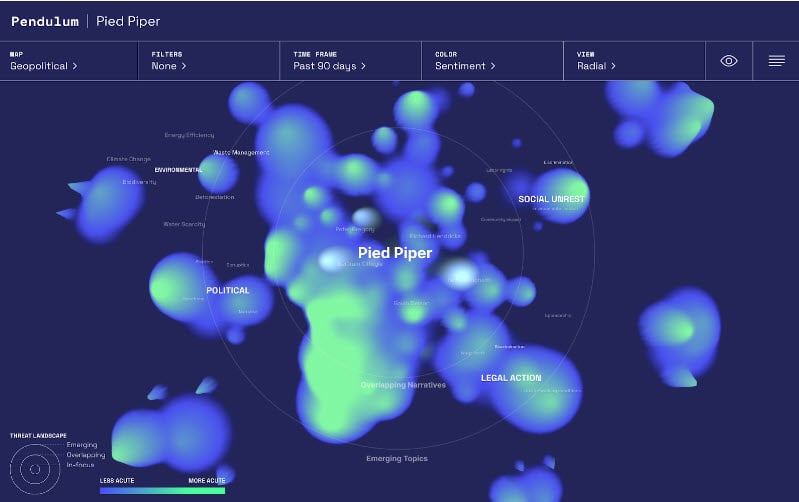Navigating threats with data visualization: RiskWand risk intelligence
At Pendulum, we're not just redefining the landscape of threat and risk intelligence; we’re empowering organizations to convert risks into...
4 min read
Pendulum : September 27, 2023

In the world of business risks, where Strategic Intelligence has taken center stage, risk analysts are the critical navigators in this complex terrain. They aim to make businesses more resilient and help executives make better decisions. This journey from reactive alert-based intelligence to proactive strategic insights requires the right tools. However, alerts, essential to running security operations, suffer critical flaws.
In the field of global security operations, challenges such as the reactive nature of alerts, the overwhelming number of non-actionable notifications, and the lack of insight into the early stages of threats are pressing issues that require a refined and proactive approach.
Alerts are reactive by design. And opening the aperture even slightly can produce an overwhelming number of alerts, making many non-actionable. This flood of information can paralyze analysts, making it challenging to discern genuine threats from false alarms. Furthermore, troubling anecdotes about companies inadvertently sending alerts to non-monitored mailboxes highlight a significant flaw in the current system. This inability to manage and effectively process alerts underscores the need for a more thoughtful approach that balances alert sensitivity with actionable insights.
An alert is merely the beginning for an analyst. They often need to invest significant time in research to validate information and explore all angles on a topic. Existing tools are overly focused on providing an alert as close to an event as possible, neglecting this crucial next step. This limitation leaves analysts grappling with incomplete information and hinders their ability to develop timely, actionable insights.
In this fast-paced environment, the pressure to respond quickly can exacerbate the problem, causing analysts to rush through the validation process. However, the lack of tools that facilitate in-depth research and analysis turns what should be a streamlined process into a time-consuming endeavor. Analysts are forced to piece together information from disparate sources, risking oversight of crucial details. Moreover, without a comprehensive view of the situation, they may miss the early drumbeat of a developing crisis, losing the opportunity to take proactive measures. The challenge is not merely about having more information; it's about having the right tools to synthesize that information into insights that can guide decisive action before a potential risk escalates.
Many existing tools concentrate solely on the event at the time of occurrence. They provide little insight into any potential build-up and often do not follow through on an end resolution. Focusing on immediate events leaves an analyst with fragmented intelligence, failing to offer a complete picture of the situation and an inability to be proactive.
Consider an historical example that highlights the importance of insight—On September 11, 2001, despite various intelligence warnings, the U.S. homeland security apparatus was tragically unprepared for terrorist attacks on the World Trade Center and the Pentagon:
In the context of bureaucratic silos, lack of inter-agency communication, and the unprecedented nature of the threat, these missed warnings led to the devastating terrorist attacks.
Analysts are increasingly frustrated with alert processing that yields little actionable intelligence needed to advise executives on reasonable and timely mitigation. When it comes to preventing risks like social media misinformation campaigns aimed at damaging a company’s reputation or tangible security threats to executives visiting overseas sites, an alert-based pipeline is insufficient.
Although some tools can inform Strategic Intelligence teams about real-time issues, they cannot advise why an event is happening or the specific circumstances that led to it. Managing risk using an alert-driven tool easily pigeonholes risk analysts into a reactive state where the analyst makes factor-dependent decisions that do not capture the full extent of the risk at hand.
For instance, location-dependent alerts about a protest occurring close to a company’s location do not provide valuable context about what started it, who is likely involved, and how public perception of the company has evolved before and during the protest.
Tools that only provide alerts leave an analyst to decide what to do with that data. And often, these alerts sit unchecked in an inbox, pending action.
At Pendulum, we recognize the importance of alerts to the intelligence lifecycle and a supplemental solution has been created to address these challenges. The advantages of Pendulum's solution include:
Pendulum allows analysts to use the construct of a Narrative as a building block, enabling them to express various aspects of an alert. This approach helps in providing a comprehensive intelligence product. For example, a DataMinr alert for a Walmart shooting in El Paso can be translated into narratives like "Walmart Threats," "El Paso Shootings," "Retail Attacks," etc. This method enriches the information and makes it more actionable across a broader set of potential targets, geographies, and threat actors.
Analysts can use Pendulum to perform extensive analyses of phenomena like environmental protests, identifying new emerging groups that are becoming more active. They can then activate monitoring for these group activities to see which companies attackers target, what tactics are being discussed, and where groups are most likely to act, enhancing their assessment and understanding of potential threats.
The shift from reactive alert-based intelligence to proactive, strategic insights is a challenging yet essential transformation. By recognizing the flaws in traditional alert systems and providing innovative solutions like Pendulum, businesses can achieve a more comprehensive and effective risk assessment. The future of risk analysis lies in embracing these new approaches, ensuring that intelligence is not just about receiving alerts but about understanding, analyzing, and acting on them before and after an event in a way that truly empowers decision-making to reduce threats before they happen.
The future of Strategic Intelligence is already here with the integration of LLMs and Generative AI. Their impact on our comprehension, strategy, and reaction to emerging risks is profound. Interested in charting the uncertainties of the future with advanced tools? Join us for a demo to discover how our groundbreaking technology can elevate your strategies.

At Pendulum, we're not just redefining the landscape of threat and risk intelligence; we’re empowering organizations to convert risks into...

Social media has evolved beyond personal updates and viral cat and challenge videos, becoming a crucial hub for real-time information. In an era...

Strategic Intelligence has always been about keeping a step ahead, but the game is changing with the advent of Large Language Models (LLMs) and...